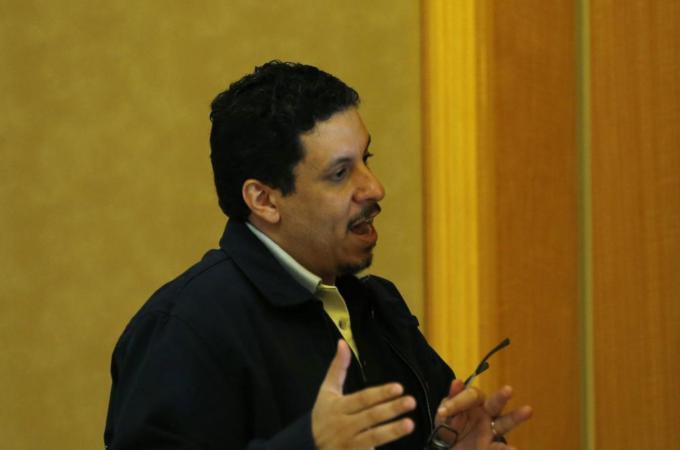Yemen president’s aide kidnapped in Sanaa

Shia rebels in control of Yemen’s capital say they have seized President Abd Rabbu Mansour Hadi’s chief of staff, a claim confirmed by a senior official.
Ahmed Awad bin Mubarak, who is also secretary general of the national dialogue set up to oversee the political transition, was seized on Saturday by gunmen at a checkpoint in Yemen’s southern Hada district.
A statement by the Shia Houthi rebels said the kidnapping was a measure to prevent a UN-brokered agreement between the presidency and them in September “from being broken”.
The chief of Yemen’s national security service, General Mohammed al-Ahmadi, told reporters “talks are ongoing to secure his release”.
Earlier, an an official from the national dialogue secretariat told the AFP news agency that “an armed group set up a checkpoint in Hada” and “captured” Ahmed Awad bin Mubarak with his companions”.
“[He was] driven away to an unknown location,” said the official who declined to be named because he was not authorised to speak to the media.
Mubarak was appointed secretary-general of the national dialogue to oversee the political transition following the 2012 resignation of veteran president Ali Abdullah Saleh after a bloody year-long uprising.
Yemen has been dogged by instability since Saleh’s removal, with the Houthis and al-Qaeda seeking to fill the power vacuum.
Mubarak was nominated for the position of prime minister but turned down the offer amid Houthi opposition.
Shia rebels in control of Yemen’s capital say they have seized President Abd Rabbu Mansour Hadi’s chief of staff, a claim confirmed by a senior official.
Ahmed Awad bin Mubarak, who is also secretary general of the national dialogue set up to oversee the political transition, was seized on Saturday by gunmen at a checkpoint in Yemen’s southern Hada district.
A statement by the Shia Houthi rebels said the kidnapping was a measure to prevent a UN-brokered agreement between the presidency and them in September “from being broken”.
The chief of Yemen’s national security service, General Mohammed al-Ahmadi, told reporters “talks are ongoing to secure his release”.
Earlier, an an official from the national dialogue secretariat told the AFP news agency that “an armed group set up a checkpoint in Hada” and “captured” Ahmed Awad bin Mubarak with his companions”.
“He was driven away to an unknown location,” said the official who declined to be named because he was not authorised to speak to the media.
Mubarak was appointed secretary-general of the national dialogue to oversee the political transition following the 2012 resignation of veteran president Ali Abdullah Saleh after a bloody year-long uprising.
Yemen has been dogged by instability since Saleh’s removal, with the Houthis and al-Qaeda seeking to fill the power vacuum.
Mubarak, a politician from the south of the country, was one of the representatives in the dialogue of the Southern Movement, which seeks autonomy or secession for the formerly independent south.
Hadi named him as prime minister in October, but Mubarak turned down the job following strong opposition from the Houthis and from Saleh’s General People’s Congress party.
The UN Security Council in November slapped sanctions, including a visa ban and asset freeze, on Saleh, the former president, and two rebel commanders for threatening peace.
Mubarak’s abduction comes a day after one of two Houthis Hadi appointed as presidential advisers late last year announced he was quitting because his advice had been ignored.
“I had done all I could in recent months to try to achieve reconciliation between Houthi rebels, and the presidency and government, Saleh al-Sammad wrote on his Facebook page on Friday.
“I tried offering the president and the government advice on the need to reassure the rebels by taking measures on the ground to build confidence that there is a serious attempt to build a state, fight corruption, and end political monopoly … but my advice fell on deaf ears.”
Since their takeover of the capital, the Houthis have pressed their advance into mainly Sunni areas in the south of Sanaa, where they have met deadly resistance from armed Sunnis, including al-Qaeda loyalists.
The turmoil has raised fears that Yemen, which lies on the key shipping route from the Suez Canal to the Gulf, may become a failed state.
Source:Jazeera